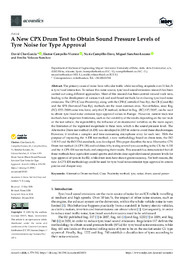Título :
A New CPX Drum Test to Obtain Sound Pressure Levels of Tyre Noise for Type Approval |
Autor :
Clar Garcia, David 
Campello Vicente , Héctor
Campillo-Davo, Nuria 
Sanchez Lozano, Miguel 
VELASCO SANCHEZ, EMILIO  |
Editor :
MDPI |
Departamento:
Departamentos de la UMH::Ingeniería Mecánica y Energía |
Fecha de publicación:
2024-06-28 |
URI :
https://hdl.handle.net/11000/33441 |
Resumen :
The primary cause of noise from vehicular traffic while travelling at speeds over 30 km/h
is tyre/road interaction. To reduce this noise source, tyre/road sound emissions research has been
carried out using different approaches. Most of this research has been centred around track tests,
leading to the development of various track and road-based methods for evaluating tyre/road noise
emissions. The CPX (Close-Proximity), along with the CPB (Controlled Pass-By), the CB (Coast-By)
and the SPB (Statistical Pass-By), methods are the most common ones. Nevertheless, since Reg.
(EC) 1222/2009 came into force, only the CB method, defined in Reg. (EC) 117/2007, can be used
to obtain tyre/road noise emission type approval values in Europe. However, current track test
methods have important limitations, such as the variability of the results depending on the test track
or the test vehicle, the repeatability, the influence of environmental variables or, the main aspect,
the limitation of the registered magnitude in these tests, which is the sound pressure level. The
Alternative Drum test method (A-DR) was developed in 2015 in order to avoid these disadvantages.
However, it involves a complex and time-consuming microphone array for each test. With the
purpose of improving the A-DR test method, a new methodology based on drum tests, the ISO
11819-2 and the ISO 3744 standards, was developed. This paper describes the new Alternative CPX
Drum test method (A-CPX-DR) and validates it by testing several tyres according to the CB, the A-DR
and the A-CPX-DR test methods and comparing their results. This research has demonstrated that all
three methods have equivalent sound spectra and obtain close equivalent sound pressure levels for
type approval of tyres in the EU, while drum tests have shown greater accuracy. For both reasons, the
new A-CPX-DR methodology could be used for tyre/road noise emission type approval in a more
precise and cheaper way
|
Palabras clave/Materias:
Alternative
Drum method
Close Proximity method
tyre
noise
drum
sound power |
Área de conocimiento :
CDU: Ciencias aplicadas: Ingeniería. Tecnología |
Tipo de documento :
info:eu-repo/semantics/article |
Derechos de acceso:
info:eu-repo/semantics/openAccess
Attribution-NonCommercial-NoDerivatives 4.0 Internacional |
DOI :
https://doi.org/10.3390/acoustics6030031 |
Publicado en:
Acoustics 2024, 6(3), 579-592 |
Aparece en las colecciones:
Artículos Ingeniería Mecánica y Energía
|
 La licencia se describe como: Atribución-NonComercial-NoDerivada 4.0 Internacional.
La licencia se describe como: Atribución-NonComercial-NoDerivada 4.0 Internacional.
.png)
